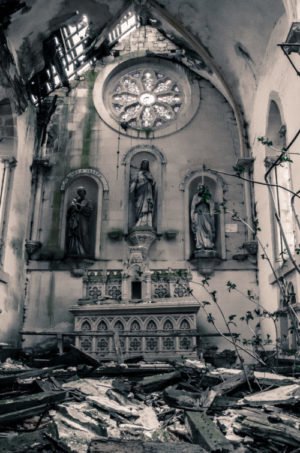The house I grew up in is full of broken things. Our appliances live on a cycle of breaking one after the other, the basement is usually damp, and the furniture has holes in it. Our cars almost always have a cracked bumper, the furnace breaks not infrequently during the Minnesota winters, and because of my siblings and I playing ball in the house, the dozens of saint statues are missing their heads. When I was younger this messy, broken house embarrassed me. Now, I cherish it.
I recently read The World Will be Saved by Beauty, Kate Hennessy’s biography of her grandmother, Dorothy Day and her own mother, Tamar Hennessy. She recalls going through her mother’s things after her death. Everything was broken. Hennessy reflects, “maybe she was drawn to all things broken…maybe she saw beauty in the cracked, chipped, and repaired. This is the paradox we all live with–this flawed vessel called to holiness.”
I thought of my family’s home and I welled up with joy. It is a house full of love and hospitality and dust and community and brokenness. I wouldn’t say my parents are attracted to broken things or love the mess. I would say they are wonderfully content with it all. The acceptance of our broken home has made us freer to fully live in it, to welcome the world into it, and to see its capacity for beauty, no matter its state.
My parents’ home was not the only broken house I grew up in. The Catholic Church is broken as well.
Perhaps the clearest admission of our brokenness came in 2000 from St. John Paul II who called for a “purification of memory” and began asking pardon for some of the Church’s great transgressions. He said, “Let us confess, even more, our responsibilities as Christians for the evils of today.” Pope Benedict XVI said in 2010, “The sufferings of the Church come precisely from within the Church, from the sin existing within the Church.”
The Church has been tarnished by the crisis of clergy sex abuse. We have ignored and hurt the LGBT community, been held back by sexism, and cowered in the fight against racism. We have given up beautiful traditions in the pursuit of being relevant. We are plagued by the acceptance of luxury and have caused scandal by our petty fights. We are broken.
Dorothy Day once wrote, “As to the Church, where else shall we go, except to the Bride of Christ? Though she is a harlot at times, she is our Mother.”
I and people I love have been hurt by the Church. The sadness that follows is valid, but the Church will always be my Mother. It isn’t flawless furniture and a functioning furnace that make a house a home. It isn’t even family members who always understand and affirm you. It is the grace to look at a messy and frustrating situation with honesty and recall that where we put love, we can find love, even when it’s hard. I have given up a fantasy that the Church will ever be without flaws and I’ve given up the idea that she needs to be in order for me to love her.
So it goes with us and God. When God thought us up, He knew we would mess up. He foresaw the ways we would hurt Him and allow our brokenness to overcome our goodness. God created us anyway because God loves us anyway.
Even in my own racism and sexism, my insecurities, my laziness and apathy, all of my sin and shortcomings, God still calls me, wants me, uses me.
I think God, like Tamar Hennessy, is attracted to broken things.
From the bumbling fisherman Jesus first called, to the podunk town of Galilee he decided to grow up in, or to the tax collectors, prostitutes, and lepers he was always walking towards, Jesus shows us God’s attraction to the broken.
When Jesus first called Simon Peter, Peter got on his knees and said, “depart from me Lord for I am a sinful man. I am not worthy.” Jesus pays little attention to that truth and simply says, “Do not be afraid. I will make you a fisher of men.” Taken, blessed, broken, and still called to be shared. For God, we are enough.
We are flawed vessels called to holiness. Sister Ruth Burrows writes, “holiness means that a human being has so affirmed, stood by, embraced their essential meaning of being a capacity for God, an emptiness for him to fill, that God can indeed fill them with the fullness of himself.”
God’s promise to abide with me was never contingent upon my performance. I am trying to be a capacity for God, and my brokenness and emptiness are precisely what allow me to receive Him. I know with my whole heart that the same is true of the Catholic Church. This is to say nothing of why I find the Church to be beautiful, true, and key to my pursuit of holiness.
Nevertheless, we can say to the Church what God says to us: The brokenness of this house need not stop me from calling it home.
-//-


